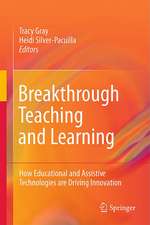Transactions on Edutainment IV: Lecture Notes in Computer Science, cartea 6250
Editat de Xiaopeng Zhang Zhigeng Pan, Adrian David Cheok, Wolfgang Mülleren Limba Engleză Paperback – 30 iul 2010
Din seria Lecture Notes in Computer Science
- 20%
 Preț: 1061.55 lei
Preț: 1061.55 lei - 20%
 Preț: 307.71 lei
Preț: 307.71 lei - 20%
 Preț: 438.69 lei
Preț: 438.69 lei - 20%
 Preț: 645.28 lei
Preț: 645.28 lei -
 Preț: 410.88 lei
Preț: 410.88 lei - 15%
 Preț: 580.46 lei
Preț: 580.46 lei - 17%
 Preț: 427.22 lei
Preț: 427.22 lei - 20%
 Preț: 596.46 lei
Preț: 596.46 lei -
 Preț: 449.57 lei
Preț: 449.57 lei - 20%
 Preț: 353.50 lei
Preț: 353.50 lei - 20%
 Preț: 1414.79 lei
Preț: 1414.79 lei - 20%
 Preț: 309.90 lei
Preț: 309.90 lei - 20%
 Preț: 583.40 lei
Preț: 583.40 lei - 20%
 Preț: 1075.26 lei
Preț: 1075.26 lei - 20%
 Preț: 310.26 lei
Preț: 310.26 lei - 20%
 Preț: 655.02 lei
Preț: 655.02 lei - 20%
 Preț: 580.93 lei
Preț: 580.93 lei - 20%
 Preț: 340.32 lei
Preț: 340.32 lei - 18%
 Preț: 938.83 lei
Preț: 938.83 lei - 20%
 Preț: 591.51 lei
Preț: 591.51 lei - 15%
 Preț: 438.59 lei
Preț: 438.59 lei - 20%
 Preț: 337.00 lei
Preț: 337.00 lei -
 Preț: 389.48 lei
Preț: 389.48 lei - 20%
 Preț: 607.39 lei
Preț: 607.39 lei - 20%
 Preț: 1024.44 lei
Preț: 1024.44 lei - 20%
 Preț: 579.30 lei
Preț: 579.30 lei - 20%
 Preț: 763.23 lei
Preț: 763.23 lei - 20%
 Preț: 453.32 lei
Preț: 453.32 lei - 20%
 Preț: 575.48 lei
Preț: 575.48 lei - 20%
 Preț: 585.88 lei
Preț: 585.88 lei - 20%
 Preț: 825.93 lei
Preț: 825.93 lei - 20%
 Preț: 763.23 lei
Preț: 763.23 lei - 17%
 Preț: 360.19 lei
Preț: 360.19 lei - 20%
 Preț: 1183.14 lei
Preț: 1183.14 lei - 20%
 Preț: 340.32 lei
Preț: 340.32 lei - 20%
 Preț: 504.57 lei
Preț: 504.57 lei - 20%
 Preț: 369.12 lei
Preț: 369.12 lei - 20%
 Preț: 583.40 lei
Preț: 583.40 lei - 20%
 Preț: 343.62 lei
Preț: 343.62 lei - 20%
 Preț: 350.21 lei
Preț: 350.21 lei - 20%
 Preț: 764.89 lei
Preț: 764.89 lei - 20%
 Preț: 583.40 lei
Preț: 583.40 lei - 20%
 Preț: 649.49 lei
Preț: 649.49 lei - 20%
 Preț: 341.95 lei
Preț: 341.95 lei - 20%
 Preț: 238.01 lei
Preț: 238.01 lei - 20%
 Preț: 538.29 lei
Preț: 538.29 lei
Preț: 388.72 lei
Nou
Puncte Express: 583
Preț estimativ în valută:
74.38€ • 77.87$ • 61.55£
74.38€ • 77.87$ • 61.55£
Carte tipărită la comandă
Livrare economică 05-19 aprilie
Preluare comenzi: 021 569.72.76
Specificații
ISBN-13: 9783642144837
ISBN-10: 3642144837
Pagini: 288
Ilustrații: X, 277 p. 142 illus.
Greutate: 0.43 kg
Ediția:2010
Editura: Springer Berlin, Heidelberg
Colecția Springer
Seriile Lecture Notes in Computer Science, Transactions on Edutainment
Locul publicării:Berlin, Heidelberg, Germany
ISBN-10: 3642144837
Pagini: 288
Ilustrații: X, 277 p. 142 illus.
Greutate: 0.43 kg
Ediția:2010
Editura: Springer Berlin, Heidelberg
Colecția Springer
Seriile Lecture Notes in Computer Science, Transactions on Edutainment
Locul publicării:Berlin, Heidelberg, Germany
Public țintă
ResearchCuprins
The Study and Design of Adaptive Learning System Based on Fuzzy Set Theory.- Modeling Personalized Learning Styles in a Web-Based Learning System.- An Emotional Agent in Virtual Learning Environment.- Lunar Surface Collaborative Browsing System for Science Museum Exhibitions.- Towards a Structural Model for Intention to Play a Digital Educational Game.- Case Study of FISS: Digital Game Based Learning for a Broad Range of Ages.- Woodment: Web-Based Collaborative Multiplayer Serious Game.- Learning with Virtual Reality: Its Effects on Students with Different Learning Styles.- Automatic Motion Generation Based on Path Editing from Motion Capture Data.- Exploration of Metaphorical and Contextual Affect Sensing in a Virtual Improvisational Drama.- Synchronizable Objects in Distributed Multimedia Applications.- Anisotropic Cloth Modeling for Material Fabric.- A Virtual Reality Simulator Prototype for Learning and Assessing Phaco-sculpting Skills.- An Augmented Reality Nanomanipulator for Learning Nanophysics: The “NanoLearner” Platform.- Fast Prototyping of Virtual Reality Based Surgical Simulators with PhysX-enabled GPU.- Dance-Based ExerGaming: User Experience Design Implications for Maximizing Health Benefits Based on Exercise Intensity and Perceived Enjoyment.- Learning Ultrasound-Guided Needle Insertion Skills through an Edutainment Game.- Sketch-Based 3D Face Modeling for Virtual Character.- A Framework for Virtual Hand Haptic Interaction.- Phone, Email and Video Interactions with Characters in an Epidemiology Game: Towards Authenticity.- A Real-Time Interactive System for Facial Makeup of Peking Opera.- Design of Educational Game: A Literature Review.
Caracteristici
Fourth volume in the Transactions on Edutainment series Outstanding contributions from EDUTAINMENT 2010 are presented together with regular papers collected for this issue Rich overview of how edutainment technologies can be creatively used for training and education purposes







